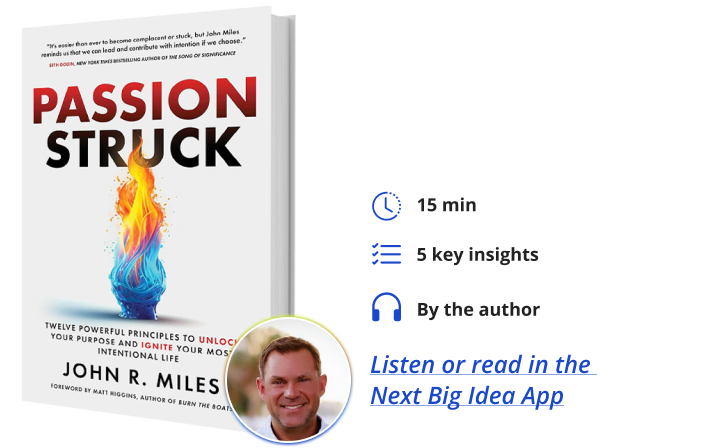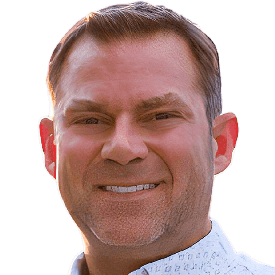John R. Miles is a former Naval Officer, Fortune 50 senior executive, entrepreneur, and the award-winning host of the Passion Struck podcast.
Below, John shares five key insights from his new book, Passion Struck: Twelve Powerful Principles to Unlock Your Purpose and Ignite Your Most Intentional Life. Listen to the audio version—read by John himself—in the Next Big Idea App.

1. The pursuit of our ideal self begins with the bold act of reinvention.
This insight resonates with the timeless wisdom of Mark Twain, who cautioned, “Twenty years from now, you will be more disappointed by the things you didn’t do than by the ones you did,” reflecting our deep human longing for self-realization. This sentiment is profoundly validated by psychologist Tom Gilovich’s research at Cornell University, revealing that 76 percent of individuals regret not pursuing their ideal selves, haunted by the “what ifs” and “should haves” of life.
This revelation uncovers a crucial truth about our nature: our deepest longings are often tied to an unrealized version of ourselves. We often leave these aspirations un-chased, held back by fear, comfort, or complacency. A prevalent transactional mindset in our society further complicates this issue, erroneously tying our self-worth to achievements and external validation. This flawed perspective leads us astray from authentic fulfillment and self-acceptance, entrapping us in a relentless cycle of seeking approval to define our value.
True success and happiness stem from embracing our authentic selves, fostering meaningful relationships, and living a life rich with love, compassion, and purpose. Central to this transformative journey is the concept of reinvention. It’s a profound shift that aligns our actions, intentions, and aspirations with the ideal self we yearn to become. It’s about bridging the gap between our present reality and our deepest dreams.
Katy Milkman’s research at the University of Pennsylvania underscores the power of fresh starts in the process of reinvention. Fresh starts (as simple as the beginning of a new week) can catalyze meaningful changes in behaviors and choices. These frequent and accessible opportunities for renewal encourage the adoption of healthier habits and setting ambitious goals—embracing an empowered “new me.”
“True success and happiness stem from embracing our authentic selves, fostering meaningful relationships, and living a life rich with love, compassion, and purpose.”
Interestingly, this path of reinvention often triggers a synergistic effect, where improvements in one area, such as physical health, can simultaneously boost other facets like mental clarity, relationships, and productivity. This interconnected growth enriches well-being and deepens our sense of mattering, contributing significantly to our overall personal development.
The journey to reinvention is a continuous one, involving intentional daily micro-choices that resonate with broader goals. These choices help develop mindset and behavior shifts that propel us toward our highest ambitions. They foster a sense of significance and contribution, reinforcing our commitment to personal mastery.
Navigating this transformative path turns us into architects of our own destiny. We shape lives that are fulfilling and true reflections of our authentic selves. This journey is the essence of becoming “Passion Struck.” It’s about living in harmony with our ideal selves, continually evolving, and growing toward our highest potential. It’s about embracing the deep sense of mattering that comes from knowing that our worth and contributions are inherently valuable.
2. Cultivate influences and an environment that align with your deepest values.
In our lives, an astounding 99 percent of our decisions are influenced by others, underscoring the need to be mindful of the influences we allow around us. This insight is especially crucial when considering the negative impacts on our well-being. Research from the Department of Biological and Clinical Psychology at Friedrich Schiller University in Germany has shown that exposure to negativity, akin to being around constant complainers, can activate stress-like responses in our brains. The longer we’re exposed to such negativity, the more it can harm our mental state, mirroring the effects of chronic stress.
I use the concept of human mosquitos to describe such negative influences. These are individuals in our circles who, often subtly, drain our energy and morale—much like mosquitos depleting blood. Often, their impact goes unnoticed until we find ourselves utterly exhausted, our vitality depleted. The key to dealing with human mosquitos is first to recognize their impact on us. This involves being aware of how we feel after interacting with them: are we left consistently depleted, anxious, or unhappy? Once we identify these draining influences, we must distance ourselves from them.
Wharton marketing professor Jonah Berger’s insights shed light on the concept of Invisible Influence. This idea underscored the conscious and unconscious ways social influences shape our decisions, emphasizing the need to actively manage these influences to preserve our mental health and pursue our ideal selves.
Equally vital alongside culling negative influences is cultivating positive influences that align with our interests, aspirations, and values. This includes seeking and nurturing relationships with individuals and communities that offer mutual support and growth.
By consciously choosing our social environment, we set ourselves on a path marked by growth and intentionality. This deliberate approach to shaping our social surroundings is a fundamental aspect of living a fulfilled and Passion Struck life filled with purpose, joy, and success.
3. Our greatest competitor is ourselves.
We’re all capable of being a visionary arsonist: someone who unknowingly undermines their own progress despite having the best intentions for personal growth and success. Imagine embarking on a journey to run a marathon, armed with determination and a clear goal. Yet, along the way, you frequently alter your training plan, diet, and objectives. These shifts, though well-intended, end up being counterproductive. The issue here is not a lack of desire or ability but unconscious behaviors that subtly obstruct the path to success.
Central to this struggle is inner dialogue. Ideally, we want that inner voice to be our coach, cheering us on. Too often, we find our inner critic speaking louder. This criticism can be crippling, filling us with doubts and fears, telling us we’re going to fail even before we start.
I did a compelling interview on the Passion Struck podcast with psychologist Ethan Kross, discussing his insightful work from his book Chatter. Kross provides a deep understanding of the silent conversations we have with ourselves and how they impact our emotions, behavior, and overall well-being. He stresses the critical importance of shifting inner dialogue from a debilitating critic to an empowering coach who guides us towards success and fulfillment.
“Ideally, we want that inner voice to be our coach, cheering us on.”
The journey from being a visionary arsonist to an architect of success begins with self-awareness. By being aware of our goals and the behaviors that impede us, we can stay true to our path, much like monitoring a GPS to ensure we’re on the right course.
Committing to a realistic plan is the next critical step. This plan is more than a set of goals; it’s a comprehensive roadmap tailored to our unique strengths and weaknesses, designed to keep us focused and on track. Mindfulness is a vital part of this process because it anchors us in the present, helping us steer through doubts and fears without losing focus of our goals.
Communication is also a valuable component. Openly discussing fears and challenges is a display of strength. Verbalizing doubts can significantly reduce their influence over us.
4. The transformative power of boundaries in honoring our true essence.
In a world often ensnared in mediocrity, embarking on the courageous journey of unwaveringly upholding your true beliefs is a solitary yet profoundly transformative odyssey. These beliefs serve as guideposts, shaping our goals, ethical choices, and emotional well-being. As the saying goes, “Good boundaries make good neighbors.”
The psychology of boundaries reinforces the importance of this journey. Just as strong boundaries are essential for harmonious neighborly relations, they are equally indispensable for building great interpersonal and professional relationships. Some individuals find themselves in the ceaseless pursuit of pleasing others, often without realizing that saying “yes” to everything also means saying “no” to something equally significant. Relentless people-pleasing can have detrimental effects on both personal life and career.
Moreover, my enlightening conversations with Gretchen Rubin and Sandy Stosz on the Passion Struck podcast highlighted the significance of self-discovery in establishing personal boundaries. Rubin, a renowned writer on happiness and human nature, emphasizes that knowing ourselves is the greatest challenge and the key to creating a happier life tailored to our individual needs and aspirations. Self-knowledge plays a pivotal role in crafting boundaries that honor your true essence.
Likewise, retired U.S. Coast Guard Vice Admiral Sandy Stosz emphasized the role of core values in self-leadership, affirming that these values provide stability and guide principled decision-making. Stosz astutely pointed out, “Personal core values are the bedrock of your character… Without core values and the grounding they provide, you will be swayed by the prevailing winds.”
“Proper boundaries play a pivotal role in personal growth, preventing burnout, reducing resentment, and promoting self-respect.”
The inability to establish healthy boundaries can often be traced back to common issues such as low self-esteem, needing approval, learned helplessness, or fear of rejection and criticism. Setting boundaries is akin to an art, a means of constructing personal sanctuaries where our well-being takes precedence. It’s deeply rooted in psychological health, requiring a profound understanding of our limits and the transparent communication of our needs in relationships.
Proper boundaries play a pivotal role in personal growth, preventing burnout, reducing resentment, and promoting self-respect. They are the linchpin of healthy, mutually respectful relationships, contributing to a more balanced and successful life. Even when some people may not fully align with your choices, they will likely respect you for standing up for what you believe in.
In essence, establishing boundaries is an act of self-preservation and self-respect. It is a proclamation that our well-being, values, and authenticity hold immense significance. By setting personal boundaries, we honor our true essence and pave the way for meaningful, fulfilling, and successful relationships in all aspects of our lives.
5. We must break free from a pinball life.
A pinball life is a metaphor for living reactively, without intention or focus. This concept was vividly illustrated during my Passion Struck podcast conversation with Dandapani, a renowned Hindu priest and author of The Power of Unwavering Focus. He advocates for nurturing behaviors that prioritize essential aspects of life, shedding unnecessary distractions that can derail us.
Growing up, I was always drawn to pinball machines, not just for their entertainment value but for what they symbolize. The flash and dazzle of the pinball machine effectively represent the distractions in our lives. Players often lose focus, leading to the game’s premature end. This is similar to how we sometimes navigate life: caught in the superficial allure of daily distractions, losing track of our true purpose and goals.
Gloria Mark, a University of California, Irvine professor and author of Attention Span, furthers this analogy. She reveals that distractions are frequently self-generated, arising from ingrained habits that disrupt concentration and flow. These self-imposed interruptions keep us locked in a constant state of distraction, steering us away from our goals.
Pinball life leads to a disengaged existence, where external stimuli pull us in multiple directions, often at the cost of our true passions. We find ourselves subject to the whims of our environment rather than making conscious, purposeful choices. Technology, especially smartphones and social media, exacerbates this issue, drawing us away from the present moment and meaningful interactions and undermining our aspirations and overall success.
Passion Struck champions the transition from reactive to proactive living. It’s about cultivating a focused, intentional engagement in every aspect of our lives. It’s ultimately choosing to step into our significance and reshape the world.
To listen to the audio version read by author John Miles, download the Next Big Idea App today:































